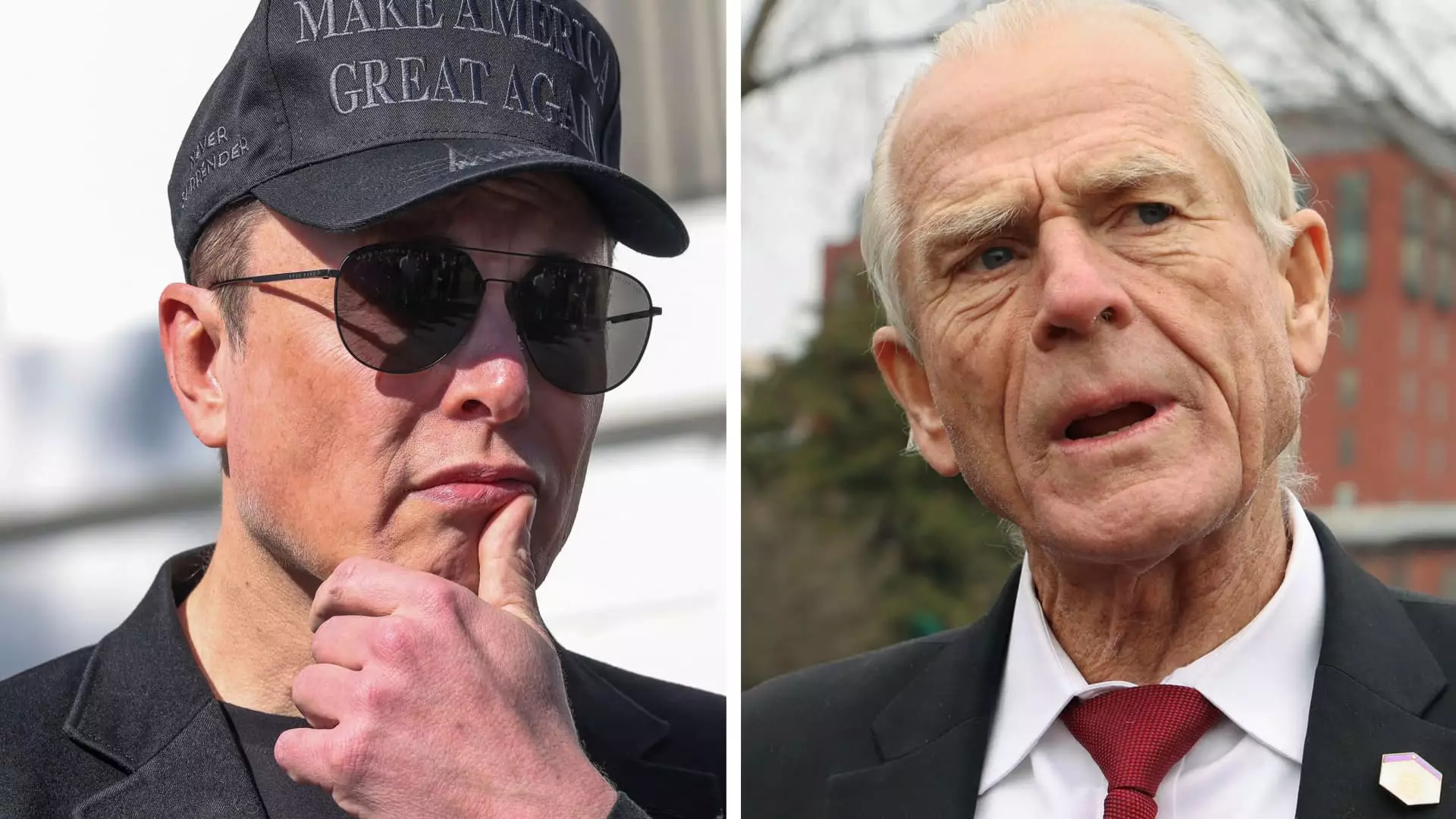The recent confrontation between Elon Musk, the CEO of Tesla and SpaceX, and Peter Navarro, a key trade advisor under former President Donald Trump, exemplifies the growing tensions within the landscape of American business and politics. Musk, known for his provocative public persona and penchant for controversy, has not held back in labeling Navarro “dangerously dumb” while criticizing his views on tariffs and trade. This public spat shifts the spotlight from mere corporate dynamics to the intersection of economics, governance, and personal vendettas.
Musk’s ire seems to stem from a mounting crisis at Tesla, with shares experiencing a significant downturn. After witnessing a 22% drop over just four trading days, the stakes for Musk have never been higher. The market’s response to deteriorating business conditions—exacerbated by Navarro’s ill-timed comments suggesting that Tesla is merely a “car assembler”—has fueled Musk’s outbursts, reflecting both frustration and desperation as he grapples with declining stock values and increasing production costs. Musk’s tweets, often lauded for their candidness, took a particularly aggressive turn when he referred to the Harvard-educated Navarro as a representation of failure in economic understanding. This clash between the two figures underscores deep ideological fissures within Trump’s administration regarding trade policies, which are now coming to a head.
Tesla’s Stock Woes: A Reflection of Wider Economic Challenges
Tesla’s financial hurdles have become emblematic of larger challenges plaguing the automotive sector, especially in the wake of tariffs on a sweeping range of imports. Analysts initially suggested that Tesla could absorb these tariffs better than competitors due to its domestic assembly lines. However, the reality is starkly different; the company is not immune to the price increases linked to imported materials, negatively affecting its bottom line. With Canada providing a sizeable portion of U.S. steel and China being a critical supplier of electronic components, the tariffs impose a significant burden on Tesla’s manufacturing ecosystem.
Musk’s request for a “zero-tariff situation” between Europe and North America reveals an intense interest in fostering a stable trading environment, especially as Tesla expands its operations globally. With plans for production in Berlin already underway, Musk recognizes the necessity of robust international trade agreements to ensure Tesla’s competitiveness. Yet this request clashes uncomfortably with the hawkish stances that characterize much of the national trade discourse today—a paradox that Musk must navigate with care. This contradictory positioning is alienating for observers who expect corporate leaders to align with prevailing patriotic sentiments rather than advocate for economic openness.
The Fallout from Musk’s Political Engagement
Musk’s controversy extends beyond his exchanges with Navarro and highlights the fallout from his political engagement during the Trump administration. His involvement in the Department of Government Efficiency (DOGE) has seen the implementation of significant austerity measures, creating a ripple effect across numerous sectors. As he orchestrates cuts to federal jobs and regulations, criticisms have mounted—from both media and public figures—regarding Tesla’s management amid rising unrest among its workforce and the public. This unrest materializes in protests and campaigns against the company, signaling discontent with Musk’s political rhetoric and how it informs corporate policies.
These tensions can be viewed through a lens of deepening polarization; Musk, once heralded as an innovator, now faces backlash not just over his business decisions but also for the overt political engagement that has alienated sections of the public. As Tesla reported a year-over-year decline in first-quarter deliveries, the question arises: Can Musk maintain his reputation as a pioneer while courting such tumult?
Musk’s journey, laden with political controversy, demonstrates the tangled relationship between corporate leadership and governance. The challenges he faces today serve as a reminder of the sometimes uncomfortable realities of the business landscape. Without a doubt, his interactions with political figures like Navarro remind us that in the world of business, personal grievances and market conditions intertwine, compelling leaders to adapt swiftly to change or risk becoming obsolete in a rapidly evolving global marketplace.

